#other of uncle vanya
Explore tagged Tumblr posts
Photo


Peter O'Toole during playing of Uncle Vanya (Bristol Old Vic, 1973) (photo by James B. Wright)
* related posts * https://myfavoritepeterotoole.tumblr.com/post/118676280762/peter-otoole-and-bike-1-2-peter-otoole https://myfavoritepeterotoole.tumblr.com/post/105688251672/peter-otoole-during-playing-of-uncle
#peter o'toole#uncle vanya#bristol old vic#stage#on the set of#smoking#1973#on the set of uncle vanya#other#other of uncle vanya#james b. wright
16 notes
·
View notes
Text






There he is. There he is. There he is.
#theatreedit#vanyaedit#vanya#uncle vanya#andrew scott#simon stephens#sam yates#rosanna vize#anton chekhov#original#*gifs#finishing this up from the other day
254 notes
·
View notes
Text
Read Uncle Vanya recently, and was struck by the similarity between Sonya's famous monologue at the end of the play and the church scene in "Beneath You." Specifically Spike's repetition of the phrase "Can we rest?"
SPIKE: [He walks to the crucifix at the altar.] She shall look on him with forgiveness, and everybody will forgive and love. He will be loved. [He stands before the crucifix, staring at it.] So everything's okay, right? [He embraces the crucifix, and his body begins to smoke.] Can we rest now? Buffy? Can we rest? - Buffy the Vampire Slayer 7x02 "Beneath You"
Here's Sonya's full monologue, though the most relevant part is at the end:
SONYA: What's to be done, we must go on living! [Pause] We shall go on living, Uncle Vanya. We shall live through a long, long chain of days and endless evenings; we shall patiently bear the trials fate sends us; we'll work for others, now and in our old age, without ever knowing rest, and when our time comes, we shall die submissively; and there, beyond the grave, we shall say that we have suffered, that we have wept, and have known bitterness, and God will have pity on us; and you and I, Uncle, dear Uncle, shall behold a life that is bright, beautiful, and fine. We shall rejoice and look back on our present troubles with tenderness, with a smile--and we shall rest. I have faith, Uncle, I have fervent, passionate faith... [Kneeling before him, lays her head on his hand; in a weary voice] We shall rest! [TELYEGIN softly plays the guitar.] We shall rest! We shall hear the angels, and see the heavens all sparkling like jewels; we shall see all earthly evil, all our sufferings, drowned in a mercy that will fill the whole world, and our life will grow peaceful, gentle, sweet as a caress. I have faith, I have faith... [Wipes away his tears with a handkerchief.] Poor, poor Uncle Vanya, you're crying... [Through tears] You have had no joy in your life, but wait, Uncle Vanya, wait... We shall rest... [Puts her arms around him.] We shall rest! [The WATCHMAN taps; TELYEGIN plays softly; MARIA VASILYEVNA makes notes on the margin of her pamphlet; MARINA knits her stocking.] We shall rest! The Curtain Falls Slowly - Uncle Vanya, Anton Chekhov (trans. Ann Dunnigan)
Uncle Vanya is a story of ennui and disappointment with life. The titular Vanya and his niece Sonya have spent their lives dedicated to supporting Sonya's father Serebryakov, a celebrated academic, at the expense of their own yearnings and ambitions in life. Over the course of the play, both experience disappointment in romantic love. They are also shocked by Serebryakov's intention to sell the estate they have poured their lives and funds into, without regard for the precarious position it will leave them in. Near the climax of the play, Vanya attempts and impotently fails to kill both Serebryakov and himself. Sonya and Vanya end the play where they began, toiling and romantically alone. On the surface, Sonya's monologue is a spiritually optimistic exhortation to endure and hope in the face of unrewarding drudgery. But it also highlights the bleak inability of the characters to change their circumstances on their own.
"When done well it’s not just Vanya who weeps. Through an act of will, the thing that has most afflicted them – drudgery – can be embraced. The (religious) reward is loaded with paradox: in death they will find rest, and new life. Whether or not you believe in God, it’s bleak yet the repeated phrases (“We shall rest!”, “I have faith”) have a persuasive force of uplift, tolling like a bell." - Dominic Cavendish, The Telegraph
The connections to Buffy are numerous. Like Buffy, Uncle Vanya depicts the existential dilemma: How to carry on in the face of cosmic indifference? If your lot is drudgery, how do you keep going? Throughout the show, Buffy experiences slaying as an often dreary, inescapable fate, one which she has to imbue with her own meaning instead of expecting recognition or the approval of authorities or institutions. In seasons five and six this metaphorical slog is made more human and literal as Buffy struggles to continue on with the everyday aspects of being an adult. Buffy gets her rest at the end of season five, but heaven only ends up being a false, temporary respite--she has to keep going.
Freshly ensouled, Spike in "Beneath You" is newly aware of the existential struggle. Like Vanya and Sonya, Spike has been romantically disappointed and disillusioned, and can no longer rely on it as a source of meaning. It parallels Buffy's own disillusionments when it comes to both romance and Romance (for more on this if curious, there's my unfinished romanticism series). Furthermore, now that he can make true moral choices, Spike is faced with the prospect of having to keep on making them--day after day after day--and living with the consequences. He now truly understands that, due to his actions, a chance with Buffy is impossible--that his labors, with Buffy in mind, like Vanya and Sonya with Serebryakov, cannot reward him--that his romantic and heroic narratives of himself are pathetic, broken. Now he'll have to find some other reason to keep on making choices, and it will be a thankless, unending task.
But the scene also inverts aspects of Sonya's monologue in interesting ways, making it both more and less optimistic. As a text, Buffy is not underwritten by any kind of religious or spiritual faith. Where Sonya puts God ("God will have pity on us"), Spike puts Buffy ("She shall look on him with forgiveness"), and this invocation of deity is more clearly ironic in Spike's case. He proceeds to drape himself on a cross, a Christian symbol, and the fact that it burns him emphasizes the inability of formal religion to provide the absolution or direction or reprieve he might crave. In general, the religious imagery in the church scene, the basic image of an empty church, supports the idea that this is a scene about the struggle for meaning. What does it mean to crave redemption if there's no God (or Buffy) to grant it to you?
What is left, instead, is the human ability to provide such things. On the one hand, in Buffy, one cannot have faith in even a bleak hope of spiritual reprieve. But on the other hand, there is a hope and belief in people's capacity for agency and change. As always, any given scene should ultimately be tied back to Buffy's story, especially when the scene is a dramatic centerpiece between Buffy and Spike--who, like the other major characters, has paralleled her throughout the show. I think it's very significant that this scene comes so early in the season. It restates, via Spike, Buffy's own struggle for meaning and agency within the Slayer fate, adult existence, and Romantic ideas that bound her. It re-establishes that this is one of the show's most central ideas, something to be re-explored throughout the season and resolved--in some way--by the end. (Which I think it is. There are a lot of connections between this scene and Buffy and Spike's final scene in "Chosen." Spike's sacrifice, done without stated belief in Buffy's love, suggests achievement of some internal locus of meaning. He burns with purpose, instead of on a cross. This parallels Buffy's triumph over the first and sharing the Slayer power. She no longer burns on the cross of self-hatred, or slogging away at an isolated fate.)
Of course, as ever, I don't know for sure whether or not Vanya was a direct influence or reference. I would say it's fairly likely. I wasn't able to find anything direct on the subject. All I was able to turn up was that Joss Whedon (who wrote and directed that scene) had not seen The Seagull--another Chekhov play--until ca 2007, which doesn't exactly help my thesis, lol. But I will say Vanya is probably the more famous play, and Whedon has a documented love of theater, given "Once More, With Feeling" and the Shakespeare readings hosted at his house and such. Also, Vanya on 42nd Street, a classic performance of the play, was released in 1994. The modern, stripped-down rendition of Vanya in that movie has aspects in common with Whedon's version of Much Ado About Nothing. Here's Sonya's monologue from that Vanya. The delivery of "We shall rest" is simple and restrained, closer to Spike's delivery of "Can we rest" than a more ecstatic Sonya performance.
youtube
The church scene, also for reference:
youtube
#i looked around to see if anyone had made this connection before#and i couldn't find anything#but correct me if i'm wrong about that would love to read any other writing on the subject#s7#buffy#spike#uncle vanya#anton chekhov#btvs#boy it's been so long i had to look up what tags i use
49 notes
·
View notes
Text
I need all the content of these middle aged men to slow the fuck down
#ofmd#ted lasso#first the pics of James lance from uncle vanya#now a gif of Rhys winking#plus the video from the other day#i have things I need to get done!!!#I can’t keep staring at The Content
5 notes
·
View notes
Text
We are lucky to be alive in the age of Andrew Scott, an actor of extraordinary breadth, skill and sensitivity, who can terrify as Jim Moriarty in Sherlock, make us fall in love (inappropriately) as the hot priest in Fleabag and cry in All of Us Strangers. He can also astonish, last year playing eight parts in a stage adaptation of Chekhov’s Uncle Vanya. He recently became the first actor to win the UK Critics’ Circle awards for best actor on stage and screen in the same year. And his latest project, Ripley, is a beautiful and chilling adaptation of the Patricia Highsmith novel The Talented Mr Ripley, with Scott playing the lead, dominating all eight one-hour episodes. It’s been a wild, crowning year for the 47-year-old Irish actor. But in March his mother, Nora, died of a sudden illness; she is who Scott has credited as being his foremost creative inspiration. His grief is fresh and intense and for the first half of the interview it seems to swim just beneath the surface of our conversation.
“We go through so many different types of emotional weather all the time,” he says. “And even on the saddest day of your life you might be hungry or have a laugh. Life just continues.” We are in a meeting room in his management company’s offices, talking about his ability, in his work, to modulate between emotions, to go from happy to sad, confused to scared, all within a matter of seconds. How does he do it? Scott laughs. “I would say that I have quite a scrutable face — is scrutable a word? — which is good or bad depending on what you are trying to achieve. But my job is to be as truthful as possible in the way that we are, and I don’t think that human beings are just one thing at any particular time. It is rare that we have one pure emotion.”
It’s an approach that is particularly appropriate for the playing of Tom Ripley, an acquisitive chameleon who inveigles his way into the lives of others (in this case Johnny Flynn, as the careless and wealthy Dickie Greenleaf, and his on-off girlfriend Marge, played by Dakota Fanning). “Ripley is witty, he is very talented. That’s gripping, to watch talent. I can’t call him evil — it is very easy to call people who do terrible things evil monsters, but they are not monsters, they are humans who do terrible things. Part of what she [Highsmith] is talking about is that if you dismiss a certain faction of society it has repercussions, and Ripley is someone who is completely unseen, he lives literally among the rats, and then there are these people who are gorgeous and not particularly talented and have the world at their feet but are not able to see the beauty that he can see.”
The show was written and directed by Steven Zaillian, the screenwriter of Schindler’s List. It’s set in Sixties New York and Italy, and filmed entirely in black-and-white, its chiaroscuro aesthetic evoking films of the Sixties — particularly those of Federico Fellini — while also offering an alternative to Anthony Minghella’s saturated late-Nineties iteration that starred Matt Damon and Jude Law. This has a darker flavour. “I found it challenging,” Scott says, “in the sense that he’s a solitary figure and ideologically we are very different. So you have to remove your judgment and try to find something that is vulnerable.”
It was a tough shoot, taking a year and filmed during lockdown. Scott was exhausted at the end of it and had intended to take a three-month break, but delays meant that he went straight from Ripley into All of Us Strangers. “Even though I was genuinely exhausted, it was energising because I was back in London, I was getting the Tube to work, there was sunshine,” he says. “I found it incredibly heartful, that film, there were so many different versions of love … I feel that all stories are love stories.”
All of Us Strangers, directed by Andrew Haigh, is about a screenwriter examining memories of his parents who died when he was 12. In it Scott’s character, Adam, returns to his family home, where his parents are still alive and as they were back in the Eighties. Adam is able to walk into the memory and to come out to his parents, finding the words that were unavailable to him as a boy. Some of it was filmed in Haigh’s childhood home, and there was a strong biographical element for him and his lead. Homosexuality was illegal in the Republic of Ireland until 1993, when Scott was 16. He did not come out to his parents until he was in his early twenties. I ask if he was working with his own childhood experiences in the film. “Of course, so in a sense it was painful, to a degree, but it was cathartic because you are doing it with people that you absolutely love and trust. I felt that it was going to be of use to people and I was right, it has been. The reaction to the movie has been genuinely extraordinary — it makes people feel and see things, and that isn’t an easy thing to achieve.”
The film is also a tender and erotic love story between Scott’s character and Harry, played by the Irish actor Paul Mescal. The two found a real-life kinship that made them a delight to watch on screen and off it, as a double act on the awards circuit. “I adore Paul, he’s so, so … continues to be …” Scott pauses. “Obviously it’s been a tough time recently and he just continues to be a wonderful friend. It’s everything. The more I work in the industry, I realise, you make some stuff that people love and you make some stuff that people don’t like, and all really that you are left with is the relationships that you make. I love him dearly.”
Scott and Mescal were also both notable on the red carpet for being extraordinarily well dressed. Scott loves fashion and has a big, well-organised wardrobe that he admits is in need of a cull. “I don’t like having too much stuff. I really believe that everything we have is borrowed — our stuff, our houses, we are borrowing it for a time. So I am trying to think of people who are the same size as me so I can give some of it away, and that’s a great thing to be able to do.” One of his favourite labels is Simone Rocha. “I love a bit of Simone Rocha. What a kind, glorious person she is. I just went to her show.” Fashion, he says, is in his DNA. “My mother was an art teacher, she was obsessed with all sorts of design. She loved jewellery and jewellery design. Anything that is visual, tactile, painting, drawing, is a big passion of mine, so I have tremendous respect for the creativity of designers.”
Today Scott is wearing Louis Vuitton trousers and a cropped Prada jacket, dressed up because he is collecting his Critics’ Circle award for best stage actor for Vanya. I ask how it feels to have won the double, a historic achievement. “Ah …” he says, looking at the table, going silent, having just been so voluble. “I’m sorry …” His voice cracks a little. “It’s bittersweet.”
At the ceremony Scott dedicated the award to his mother, saying of her “she was the source of practically every joyful thing in my life”. Is it difficult for him to carry on working in the circumstances, I wonder. “Well, you know, you have to — life goes on, you manage it day by day. It’s very recent, but I certainly can say that so much of it is surprising and unique, and there is so much that I will be able to speak about at some point.”
He is looking forward, he says, once promotion for Ripley is over, to taking some time off, going on holiday, going back to Ireland for a bit. He has homes in London and Dublin. To relax he walks his dog, a Boston terrier, dressed down in jeans and a hoodie “like a 12-year-old, skulking around the city” or goes to art galleries on the South Bank — he was considering a career as an artist until he was 17 and got a part in the Irish film Korea. He goes to the gym every day, “not, you know, to get …” he says, flexing his biceps. “More that it’s good for the head.” He is social, likes friends, likes a party. When I ask if he gave up drinking while doing Vanya, which required him to be on stage, alone, every night for almost two hours, he looks horrified. “Oh God, no! Easy tiger! Jesus … Although I didn’t drink much, I did have to look after myself. But we had a room downstairs in the theatre, a little buzzy bar, because otherwise I wouldn’t see anybody, so I was delighted to have people come down.”
Scott was formerly in a relationship with the screenwriter and playwright Stephen Beresford and is currently single, although this is not the sort of thing he likes to talk about. He is protective of his privacy, not wanting to reveal where he lives in London, or indeed the name of his dog — but he swerves such questions with a gentle good humour.
He is famous on set for being friendly and welcoming, for looking after other people. “The product is very important, but most of my time is spent in the process, so I want that to be as pleasant and kind as possible. I feel like it is possible to do that, that it is an honourable goal.” He is comfortable around people, with an easy charm — no one I have interviewed before has said my name so many times. And although when we talk he sometimes seems reflective or so very sad, there are also moments when he is exuberant, silly, putting on accents. “I feel like, as a person, I am quite near my emotions. I cry easily and I laugh easily, and there is nothing more pleasurable to me than laughing.”
Scott was raised a Catholic and is no longer practising, but says his view about religion is “ever changing — I definitely have a faith in things that cannot be proved”. When he was younger and felt overwhelmed, just before or after an audition, he would go to the Quaker Meeting House in central London and sit in silence, something that made its way into the second series of Fleabag, in which Scott’s priest takes Waller-Bridge’s character to that same meeting house. “It’s just around here,” he says, standing up, looking out of the window at Charing Cross Road. “When Phoebe and I first talked, we met at the Soho Theatre. We talked about love and religion, we walked all around here. And I said, ‘This is a place I go,’ so we called in and there was no one there, so we sat in there and we talked. It was a really magical day.”
Scott says he sees all the different characters that he has played as versions of himself. “It’s like, ‘What would this version of me look like?’ rather than, ‘Oh, I’m going to be somebody else.’ You filter it through you, and you discover more about yourself. I think that is a very lucky thing to be able to do, to find out more about yourself in the short time that we are here.”
#Andrew Scott#Ripley#Nora Scott#Critics Circle#Vanya#Chekhov#West End#All of Us Strangers#Paul Mescal#Hot Priest#Fleabag#Phoebe Waller-Bridge#Jim Moriarty#Sherlock#Patricia Highsmith#The Talented Mr Ripley#Dickie Greenleaf#Marge Sherwood#Dakota Fanning#Johnny Flynn#Steven Zaillian#Matt Damon#Jude Law#Anthony Minghella#Simone Rocha#Louis Vuitton#Andrew Haigh#Korea#Stephen Beresford
98 notes
·
View notes
Text
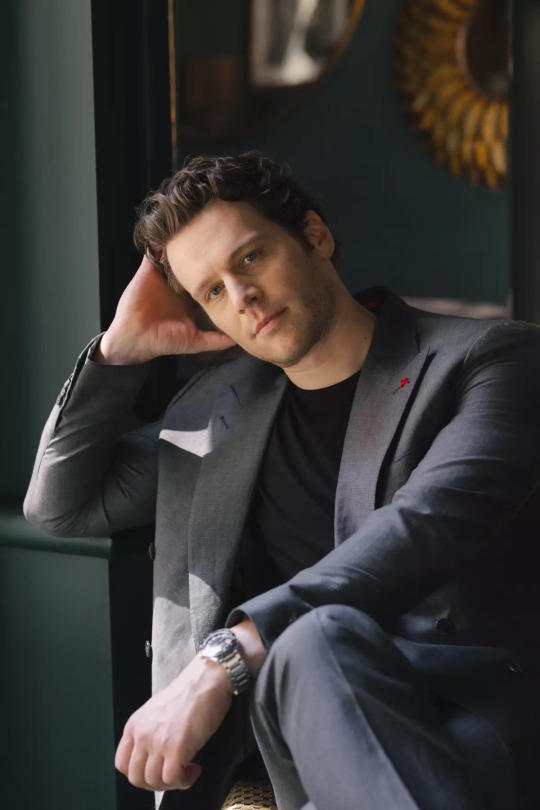
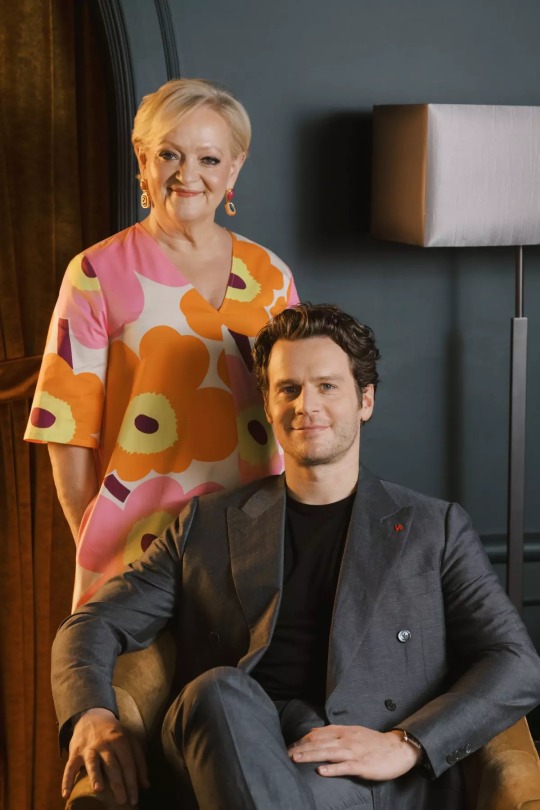
Excerpts from an interview with Jonathan and Maria Friedman at the Los Angeles Times by Charles McNulty, with photos by Justin Jun Lee:
Hopefulness and regret are calibrated to perfection in a revival that ought to be filmed before it closes July 7. I’ve seen the New York production twice, and the psychology only deepens on subsequent viewing.
The key to making this work — which is to say making us care — is the performance of Groff, who humanizes Frank’s choices without sentimentalizing his arc. Frank can come off as a narcissist, a guy who can’t resist whatever shiny object happens to be in front of him. But Groff, who received Tony nominations for his performances in “Spring Awakening” and “Hamilton” and deserves to win for his beautifully layered work in “Merrily,” reveals what Mary and Charley see in him and don’t want to give up on: an answer to their dreams of fulfillment — romantic in Mary’s case, artistic in Charley’s.
Groff was fresh from filming HBO’s “Spring Awakening: Those You’ve Known,” a reunion concert with the show’s original cast and creative team, when casting director Jim Carnahan asked him about his interest in “Merrily.” He immediately watched the London production on YouTube and was struck by an image from the opening number that matched something he had just re-created for the “Spring Awakening” doc.
“Frank walks out with a red folder, and Mary and Charley come out and stand in the exact positions that John Gallagher Jr. and Lea Michele stood in at the end of ‘Spring Awakening,’ with the girl over the left shoulder, the guy over the right,” he said, speaking from his dressing room at the Hudson Theatre. “That is the final bit of ‘Spring Awakening’ and I was like, ‘Oh, that’s so weird. I just lived that.’”
But it was one of Frank’s lines that really clinched the deal for Groff: “I’ve made only one mistake in my life. But I made it over and over and over. That was saying ‘yes’ when I meant ‘no.’” “When I heard that,” Groff said, “I went, ‘Oh, my God. I have to play this. I have done that. I’m just learning how to not do that. Yeah, I get him.’”
“I cast Jonathan for many reasons,” Friedman said. “One, because he’s absolutely brilliant. But I cast a big heart, a beating heart.”
“The amusement and bafflement of having a go at life and everyone wanting a piece of you — that is the place that Jonathan works from,” Friedman said. “Everyone wants a piece of Frank. That’s what happens with brilliant people. Jonathan is not just brilliant and beautiful but also one of the kindest men. And kindness is central to this production.”
Groff, who was exceptional in the short-lived HBO series “Looking” about a group of young gay men living in San Francisco, said that, from “a queer perspective,” he could identify with the way Frank represses parts of himself to please others.
“Growing up closeted, I became an expert at dodging questions and shining a light on other people,” he said. “This can create a relationship dynamic where you’re in a constant state of service to others — like the perfect son who’s hiding something. That stereotype feels connected to the way Frank supports everybody’s dreams, talents, neuroses and needs. He’s able to do it because he’s full of passion and genuine love for those people.”
So how exactly did Friedman, Groff & Co. finally solve the riddle of “Merrily”? By approaching it the way they might a play by Shakespeare or Chekhov, sifting through the lyrics as though they were lines in “Hamlet” and digging into the psychology of the characters as though mining subtext in “Uncle Vanya.”
This revival, fittingly, has been a team effort. And the ensemble’s collaborative joy only reinforces our sense that, however much Frank, Charley and Mary may bitterly disappoint one another, their bond will always be the best thing that ever happened to them.
#jonathan groff#merrily we roll along#maria friedman#merrily promo#interview#spring awakening#spring awakening those you’ve known
39 notes
·
View notes
Text
Tagged by @the-mad-woman-in-the-attic to make a poll with my ten favorite fictional women.
What to make of this list? (Because I like to analyze myself.)
A- Most of them can be divided into two categories:
1) Privileged women-children who have difficulty transitioning into adulthood or to take others’ views into consideration and are basically only surviving through their hostility to the outside world and their obsession with their own family unit. (Nihal, Merricat, Seniha) (Sonya is a bit different as she is a saint but she also seems destined to be a “girl” forever).
2) Women of uncertain (but certainly lowly) backgrounds who dare to desire and love for themselves (Nigar, Charity, Danvers).
Catherine is kind of in an in-between position but is closer to the first category. Francie and Mulan are more conventional relatively well-adjusted coming-of-age protagonists (not a coincidence that they are the ones who are protagonists of the works aimed at a younger audience) but they are also “outsiders” in their community.
B- In terms of gender expression all of these girls and women are “medium”. They are a diverse bunch in age, “beauty”, ethnicity, class background and sexual expression, but there is not one “bimbo” or “butch” among them. This is unsurprising, I myself am a very “medium” woman in terms of gender expression. (I personally don’t read Mulan as “butch”).
I am sure more things can be found but these are the patterns that I have noticed.
I am tagging @princesssarisa @ariel-seagull-wings @desmoonl @zeldaxxi
13 notes
·
View notes
Text
Broadway Divas Tournament: Round 2A


Laura Linney (1964) "LAURA LINNEY (Diana) Broadway credits include My Name is Lucy Barton (Tony nom. dir. Richard Eyre): The Little Foxes (Tony nom.) Time Stands Still (Tony nom.) and Sight Unseen (Tony nom.) all directed by Daniel Sullivan at MTC. Other credits include Les Liaisons Dangereauses, The Crucible (Tony nom.), Uncle Vanya, Hedda Gabler, Honour, Holiday, The Seagull, Beggars in the House of Plenty, Six Degrees of Separation. Television credits: "Armistead Maupin's Tales of the City," "Ozark" (SAG, Emmy nom), "The Big C" (Emmy, Golden Globe Awards), "John Adams" (SAG, Golden Globe, Emmy Awards), "Frasier" (Emmy Award), "Wild Iris" (Emmy Award), "The Laramie Project," "Tales of the City" trilogy. Film: Falling, The Dinner, Nocturnal Animals, Sully, Sympathy for Delicious, Morning, The Details, The Savages (Oscar nom), Kinsey (Oscar nom), You Can Count on Me (Oscar nom), The Other Man, City of Your Final Destination, The Squid and the Whale, Jindabyne, Love Actually, Mystic River, The Nanny Diaries, Breach, Man of the Year, The Hottest State, Driving Lessons, The Exorcism of Emily Rose, P.S., The Life of David Gale, The Mothman Prophecies, Maze, The House of Mirth, The Truman Show, Absolute Power, Primal Fear, Congo, Lorenzo's Oil, Dave. Training: The Julliard School, Brown University. Member: AEA, SAG." - Playbill bio from Summer, 1976, June 2023.
Audra McDonald (1970) "AUDRA MCDONALD (Suzanne Alexander) is honored to take part in Adrienne Kennedy's historic and long overdue Broadway debut. A board member of Covenant House International and co-founder of Black Theatre United, McDonald is a singer, actor, and activist who lives in New York with her amazing husband and children." - Playbill bio from Ohio State Murders, December 2022.
NEW PROPAGANDA AND MEDIA UNDER CUT: ALL POLLS HERE


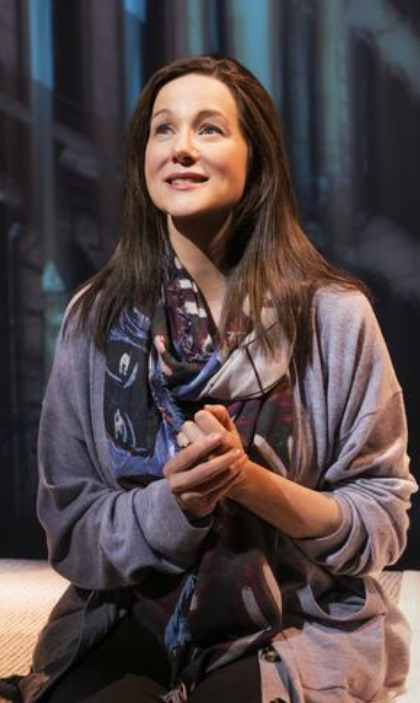
youtube
"Do you ever think Laura Linney reads her playbill bio and cries? Does she dream of the day when she too will hold a Tony Award aloft in triumph, or has she resigned herself to being one of four actresses with the biggest fail rate and will one day hold the record outright? (Given that Estelle Parsons is in her nineties, Dana Ivey is in her eighties, and Jan Maxwell, my beloved, is dead?) Anyway, the point of this isn't to rub salt in the wound. Love you, Laura Linney."

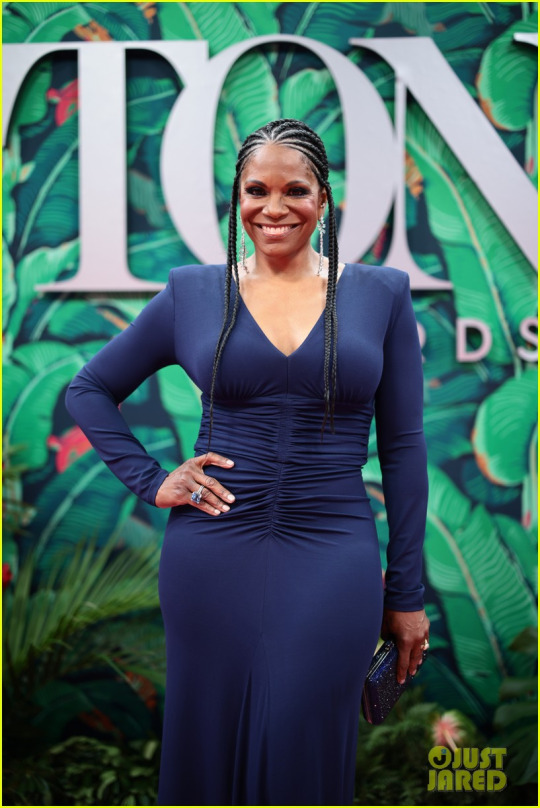
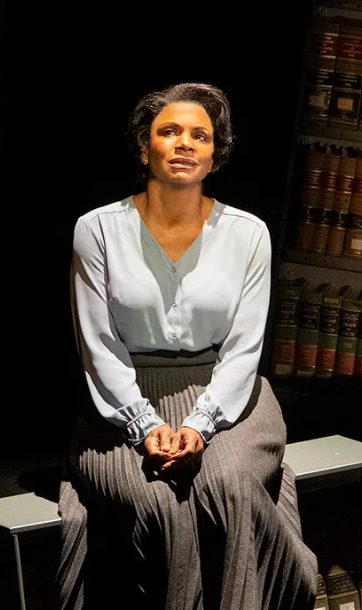
youtube
"It's too mean to title this poll Biggest Tony Winner vs. Biggest Tony Loser but it's pretty damn accurate, and given the overwhelming whiteness of award shows overall, it's damn satisfying that the Black woman is the one with a record-breaking Tonys on her shelf and the white blonde woman is not (no matter how talented she is). Audra McDonald, my beloved, you're going to sweep this entire tournament."
#broadwaydivastournament#broadway divas#broadway#theatre#poll tournament#audra mcdonald#laura linney#round 2a#wait everyone hold the fuck on.#it's been five years and i just noticed audra specifically switched her fancy earrings for plain hoops for the bit
37 notes
·
View notes
Text
Having played parts from Prospero to Stalin, Hamlet and now the poet AE Housman, Simon Russell Beale is convinced he has one of the best jobs in the world. Why? Every new role offers a new area for intellectual investigation, not least when he gets to take on the logical arguments and ‘linguistic fireworks’ of one of his friend Tom Stoppard’s plays, he tells Fergus Morgan
You cannot complete acting – but if you could, Simon Russell Beale would be coming close. Over a three-decade career, he has taken on dozens of classic roles in canonical plays: Konstantin in The Seagull, Ferdinand in The Duchess of Malfi, Oswald in Ghosts, Lopakhin in The Cherry Orchard, Scrooge in A Christmas Carol, the title characters of Edward II, John Gabriel Borkman and Uncle Vanya, and loads more.
And, when it comes to Shakespeare, there are few parts the 63-year-old has not played. Hamlet? Tick. King Lear? Tick. Macbeth? Tick. Richard II and Richard III? Tick, tick. Benedick, Iago, Malvolio, Leontes? Tick, tick, tick, tick. Falstaff and Prospero? Tick, tick.
With a theatrical résumé as comprehensive as that, where does Russell Beale go next? In a recent interview with the Telegraph to mark the release of A Piece of Work, the memoir he “slightly sheepishly” wrote, the actor said he would be keen on playing Cleopatra. Why not? It would not be his first foray into gender-swapped Shakespeare: he played both Hippolyta in A Midsummer Night’s Dream and Desdemona in Othello as a schoolboy.
“Unfortunately, I wasn’t being serious,” Russell Beale says. “I was being facetious, although I did see Mark Rylance do it 20 years ago and it was sensational. It is one of the great parts, but I don’t think that would work. It would probably be too scary for the audience.
“I would love to do Falstaff on stage as I’ve only done that on film,” he continues. “I would like to do another King Lear. I wasn’t particularly happy with my Macbeth, so I’d quite like to do that again one day. I’m getting a bit old now, though, so it has become slightly difficult. Perhaps one day I should try my hand at directing. I don’t know, really.”
Before he has a go at directing, or revisits Lear, or has a stab at Cleopatra, Russell Beale will be playing poet AE Housman in Blanche McIntyre’s revival of Tom Stoppard’s The Invention of Love at Hampstead Theatre in north London. Our interview is taking place via Zoom, with Russell Beale – black jumper, big beard – sat in an office somewhere inside the Swiss Cottage venue.
“There’s a very good novel here about Booth, the man who assassinated Lincoln,” Russell Beale remarks, browsing the bookshelves in front of him. “Anyway, nice to meet you.”
Russell Beale’s pre-interview bookshelf inspection confirms what he subsequently says about his character, about his approach to playing parts and about his professional motivations. He is, first and foremost, driven by an insatiable intellectual curiosity. He once described acting as “three-dimensional literary criticism”.
“I have one of the best jobs in the world, really,” he says. “Every single project potentially offers a new area of study. I know that sounds sort of dry, but if someone says: ‘I’d like you to do a play about a poet in the late 19th century who also happened to be the greatest classical scholar of his time,’ I think: ‘Wow.’ And, for a very short period of time, I get to become a bit of an expert on AE Housman.
“Or take Samuel Foote,” he continues, referencing the 18th-century actor and title character of Ian Kelly’s play Mr Foote’s Other Leg, which he played at Hampstead in 2015. “Doctor Johnson called Foote the most famous man in England, but I’d never heard of him. Now I could tell you all about him – where he lived, how he was arrested for sodomy and the legal case that followed. That sort of intellectual buzz is, I think, the most interesting thing of all about acting.”
Different jobs have different intellectual appeals, says Russell Beale. Some plays are stimulating for their historical subject matter. Shakespearean work is all about “digging around in this incredibly complicated, malleable script to find the emotional life of a character”. Other projects are attractive on a conceptual level, he says, like Joe Hill-Gibbins’ drastically cut, fast-forwarded staging of Richard II at London’s Almeida Theatre in 2018.
“I was far too old to play Richard II,” Russell Beale says. “I’d sort of assumed that was one part I would never do. Then along came this director who wanted to do it in a completely different way. It was incredibly cut down. It was staged straight-through with all the other characters milling around on stage. That was the challenge there.”
From screen to Stoppard
Where, then, does Russell Beale’s work in film and television fit in, beyond boosting his bank balance? His screen CV is not as formidable as his theatrical résumé, but it still encompasses Armando Iannucci’s comedy The Death of Stalin, the latest series of HBO’s blockbuster House of the Dragon, and the forthcoming Downton Abbey film.
“I suppose I just do that for fun, although I do have an interest in how those projects work,” Russell Beale says. “Take House of the Dragon. I remember wondering how they physically achieve a show like that. That was intriguing to me. I thought: ‘How the hell do you do a great big castle in a thunderstorm?’ It was this huge set with water literally cascading down the walls. The sheer skill was extraordinary. That was fascinating.”
If any writer could satisfy Russell Beale’s voracious intellectual appetite, it is Stoppard, whose plays frequently dazzle with their virtuosic use of history and intertextuality. Think of Rosencrantz and Guildenstern Are Dead, his existential 1966 riff on Hamlet that echoes Samuel Beckett’s Waiting for Godot. Or 1972’s metaphysical murder-mystery Jumpers, perhaps the most philosophically and athletically gymnastic play ever written.
Those Stoppard plays are the only two that Russell Beale has performed in until now. He played Guildenstern at the National Theatre in 1995, having previously performed in the play as a teenager, then took on the lead role in Jumpers – the philosopher George Moore – at the same venue in 2003. That production transferred to New York, and provided Russell Beale’s Broadway debut. The New York Times critic Ben Brantley hailed a “dazzling” performance of “sharp inventiveness and peerless emotional depth”.
“I’ve only done two Stoppard plays, but I’ve always been quite fierce in defending him against accusations of being over-intellectualised,” Russell Beale says. “Stoppard is intellectual, of course. He plays intellectual games. But what Stoppard always comes down to is people feeling passionate about something, usually another person. That, I think, is fundamentally the most important thing about his writing.
“Rosencrantz and Guildenstern is about two men who are lost in a world they don’t understand,” he continues. “Jumpers is about trying to cling on to a broken marriage. I saw The Real Thing recently at the Old Vic, which I saw with the great Stephen Dillane a couple of decades ago. That play is more directly about love than anything else.”
Playing with words
The Invention of Love, which premiered at the National in 1997, begins in the afterlife. Housman, dead at 77 in 1936, stands on the bank of the mythical river Styx, preparing to board a ferry. The play then unfolds through Housman’s memories of his time studying classics at the University of Oxford, with the older Housman – played by Russell Beale – interacting with his younger self, played by Matthew Tennyson. At the heart of its fizzing academic ideas is Housman’s unrequited love for fellow scholar Moses Jackson.
“The play is very complicated,” says Russell Beale. “This morning, we were rehearsing this very elaborate scene with all these 19th-century academics playing croquet. Stoppard ties in so many references to Victorian cultural icons like Jerome K Jerome and Henry Liddell and Lewis Carroll, too. Everyone has these great arias about philosophy and art.
“Underneath that, though, it is about an old man remembering his love for another man,” Russell Beale continues. “It is about a particular event in their lives, a rowing trip on the river when they were both at Oxford. It is about memory. It is about what you do with a love like that. It is about what a love like that means at the end of your life.”
The “incredible enjoyable” challenge of performing the play, says Russell Beale, is really getting to grips with its intellectual complexities and “linguistic fireworks” – as is the case with most Stoppard plays. If you can master the tongue-twisting dialogue and head-scratching arguments, he says, then the profoundly emotional core of the drama will come.
“Years ago, I remember the actor John Wood, who was one of the great language magicians, talking about Bernard Shaw,” Russell Beale says. “Now, I don’t particularly like Bernard Shaw, but Wood said that if you observe all the punctuations that Bernard Shaw set down as indications of when to breathe and so on, he does the work for you. “It is sort of like that with Stoppard,” Russell Beale continues.
“It is like a technical exercise. You have to end the sentence when it ends and make sure you give yourself gaps to breathe. And then it is about the clarity of the argument. The play does explore emotion. The word ‘love’ is in the title, after all. But performing it is not an emotional thing. It is more about a series of arguments. If you can get the grammatical, syntactical construction of the sentences, and then the actual logic of the argument, then you are on your way.”
It helps, says Russell Beale, that director McIntyre read classics at Oxford herself.
“My God, she does know what she is talking about,” he says. “I have no idea what I’m talking about when it comes to Latin or Greek, but she does have that string to her bow.”
The admiration is mutual. Via email, McIntyre says that she finds Russell Beale “extraordinary”.
“I think he is our greatest living Stoppardian actor,” she writes. “The wit and depth of feeling he brings to the character are breathtaking. It’s a privilege to watch him work.”
It helps, too, that Russell Beale is friends with Stoppard, who turned 87 this year. In fact, he adds, he received a first-hand insight into the playwright’s process of putting The Invention of Love together nearly 30 years ago when performing at the National. “I met Tom, I think, when we did Rosencrantz and Guildenstern,” Russell Beale says. “My memory is that he was writing, or thinking about writing, The Invention of Love at the time, because I remember he gave me a lift home once because he was driving in the same direction, and he started talking about Oscar Wilde and Housman on the way.
“I’ve known Tom for years now,” Russell Beale adds. “He was in last week, actually. He was on great form. He likes revisiting his plays, I think. He reads the script very intently, as if he is rediscovering it. It is rather lovely to see him do that. It’s quite moving, actually.”
Russell Beale was born in Penang in what was then Malaya – now Malaysia – in January 1961, one of six children of military physician Peter Beale, who would later become the British Army’s surgeon general, and his wife Julia, who was also a doctor. He was sent to boarding school, first at St Paul’s Cathedral School, where he was a chorister, then at Bristol’s Clifton College.
It was there that Russell Beale first discovered his love for performance, both theatrical and musical – he is an accomplished pianist, oboist and singer, and frequently presents radio and television shows about classical music. He has often credited a stern English teacher called Brian Worthington with instilling in him that respect for intellectual rigour and academic curiosity.
He went on to study English at the University of Cambridge, where he threw himself into student drama and made friends with Tilda Swinton, then trained at Guildhall, initially as a singer before switching to acting, graduating in 1983.
He started his professional career at Edinburgh’s Traverse Theatre, but his big break came two years later with a role in Women Beware Women at London’s Royal Court, alongside a young Gary Oldman. It was not until 1991, however, five years into his long relationship with the Royal Shakespeare Company, that Russell Beale felt like he could fully express himself on stage, when he was cast as Konstantin in a production of Chekhov’s The Seagull staged by the company’s director Terry Hands.
“Until then, I’d done a lot of comic parts,” Russell Beale says. “That was the first time somebody said: ‘No, you can do something serious. You can play someone with an emotional life that is serious.’ Terry did it deliberately, I think. He thought: ‘Here’s this guy who is being typecast and I’m going to cast him against type.’ And that changed my life. It led to people suggesting I do Hamlet and other stuff. I am enormously grateful to him.”
It was Hands, too, who forged one of the great collaborations of Russell Beale’s career, with director Sam Mendes. The pair first worked together at the RSC in the 1990s on productions of Troilus and Cressida, Richard III and The Tempest, then at the National Theatre on Othello in 1997 and, at the Donmar Warehouse, King Lear in 2014 and Twelfth Night in 2002, as well as on the globe-trotting production of The Lehman Trilogy in 2019.
“Sam and I have been doing stuff together for 30 years and it was Terry that put us together,” Russell Beale says. “Sam actually called me when Terry died in 2020. I was in the dressing room for The Lehman Trilogy in New York. He was very emotional. He told me Terry had died and that he was the one who had originally put us together. Terry was the one who said to Sam: ‘I think you’d like that actor over there.’”
There is an alternate reality in which Hands never cast Russell Beale as Konstantin in The Seagull and Russell Beale continued working as a comic actor. He would no doubt have been successful – witness his hilarious turn as spymaster Lavrenti Beria in The Death of Stalin – but he would not have plumbed the remarkable depths he has in this world.
What makes him stand out as an actor – and what has earned him countless accolades, including three Olivier awards, two BAFTAs, a Tony and a knighthood – is his ability to incarnate familiar characters in unexpected ways. He has played the majority of the most famous roles in the classical canon, but his interpretations are always invested with a distinct air of isolation or awkwardness. Perhaps it has something to do with the fact that he has frequently approached those roles at an unconventional age.
“In retrospect, my career sort of looks like this marvellous plan, but it wasn’t,” he says. “It was all an accident. I’ve done all the parts at the wrong age. I was a very old Hamlet and a very old Benedick, and a very young Richard III and a very old Richard III.”
Empathy with outsiders
Nicholas Hytner, another director with whom Russell Beale has a long relationship, having starred in his stagings of The Alchemist, Much Ado About Nothing and Collaborators at the National Theatre in 2006, 2007 and 2011 respectively, and, more recently his versions of A Christmas Carol and John Gabriel Borkman at the Bridge Theatre in 2020 and 2022, has said of Russell Beale: “He has extraordinary empathy with outsiders, the wounded, the foolish, the warped and the lonely. He hears their music and can sing it.”
“What did he say?” asks Russell Beale. “I’ve not heard that before. That is the most beautiful, lovely thing to say. And yes, I’m always excited by those characters. The most interesting parts are those that are looking in from the outside or confused about their position. I don’t know what that says about me. I’ve never interrogated it. I refuse to.”
If Russell Beale does not interrogate his own interest in playing isolated, uncomfortable characters on stage, does he ever interrogate theatre’s wider role in society? “That’s a very interesting question,” he says. “I suppose it is always in the back of your mind. Perhaps theatre is a bit of a sideshow now, although Wicked has just been turned into a film, for God’s sake. The biggest movie of the year started as a theatre show. Perhaps theatre only has a relevance when it is adapted into a medium now.
“No, I don’t think that, actually,” he adds. “That implies it is all about numbers, that something is only important if a lot of people see it. I don’t believe that. I still believe theatre has weight and relevance. I suppose I would fall back on the Tom Stoppard argument in The Invention of Love: ‘There is no little too little to be worth having.’”
#simon russell beale#interview#a really really big interview#the stage#stage#the invention of love#tom stoppard#also stephen dillane mention#stephen dillane#nicholas hytner#blanche mcintyre#2024
10 notes
·
View notes
Note
So exciting that you got to see James Lance at Carfest! Can you share what else he talked about during his session? I am so curious, and I haven't been able to find any other details about it.
Sure! He talked about his career, his approach to acting and learning lines and how he always wants a 'beginners mindset' and loves learning new techniques. Especially with his role as Uncle Vanya recently and advice from his 4(?) acting coaches. He told an anecdote about his time with Joanna Lumley on AbFab starting out. He spoke about his start in adverts (persil and rice krispies apparently so get googling).
He spoke about how he enjoyed developing Trent's character over 3 series. He said that he hasn't had many opportunities to do multi season shows so loved that trent slowly became 'the man he was always meant to be'. He mentioned about that post S1 conversation with Jason in the carpark where he outlined his backstory he'd created for Trent about his father.l wanting him to be something he wasn't. An alpha male strong type. He spoke about the importance of fatherhood and how his own father (sadly passed) 'really enjoyed me as a person' and how damaging it just have been for Trent to not have that. He then spoke about having his own son has changed his life and priorities and how he wants to be there for him etc.
He spoke about the ethos of ted lasso (onscreen and BTS) and how it inspired him personally: being open and truly yourself and connecting with other humans. He said that his favourite scene from the show was the Colin conversation at the homomonument.
This is all terribly paraphrased as I remember sorry. Erm he spoke about the famous five and what fun that was. He said he'd love to work with David Lynch and Penelope Cruz and Bluey (all for very different reasons). He joked this should be a musical and when someone asked oh you'd like to do a musical he said no he absolutely can't sing.
Generally it was a very funny informal chat about life, Trent Crimm and acting as a profession.
13 notes
·
View notes
Text
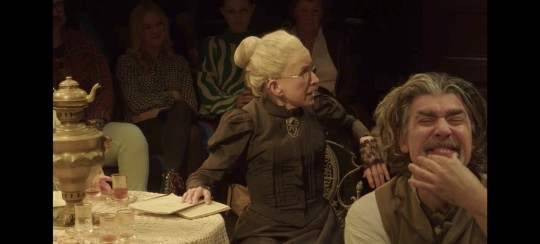
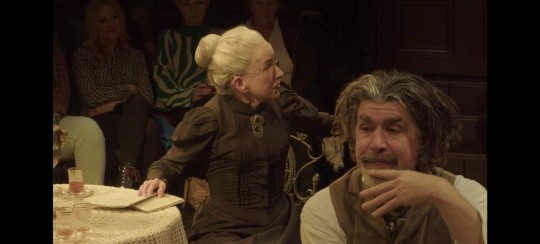
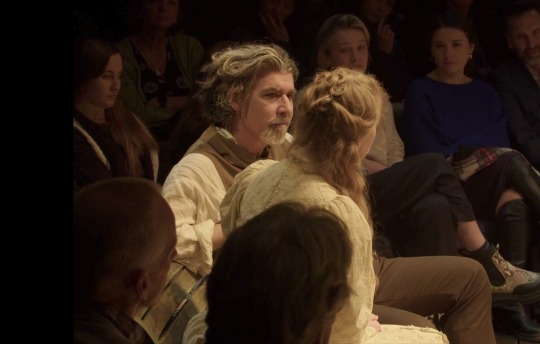
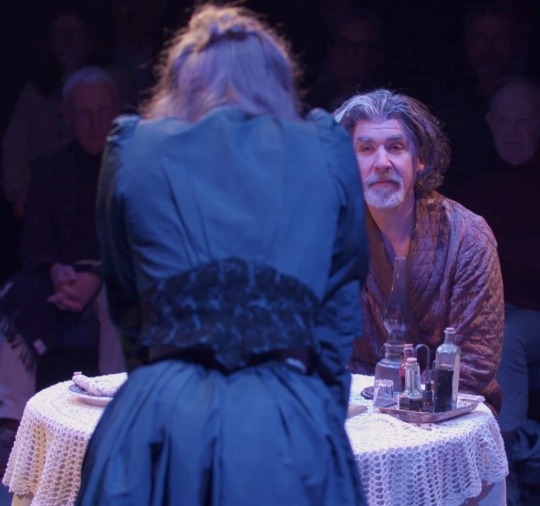
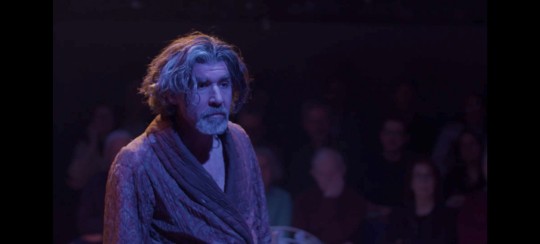
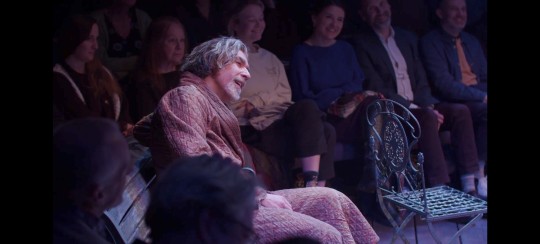
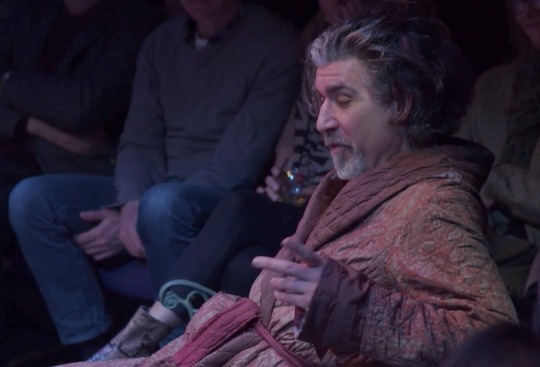
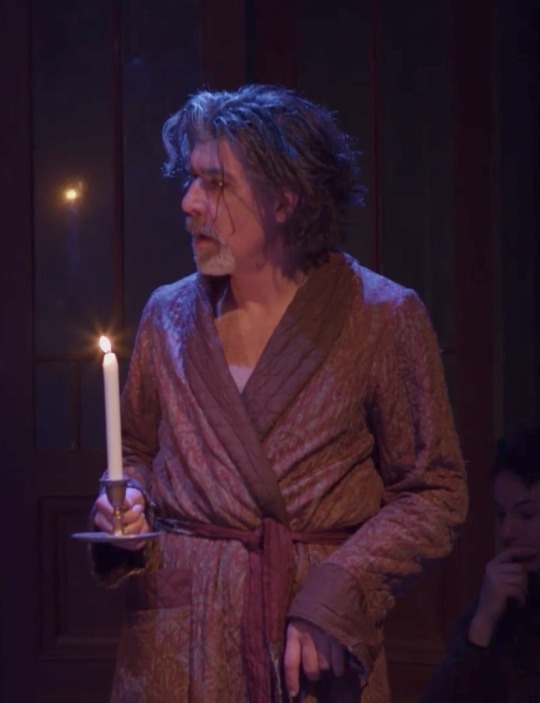
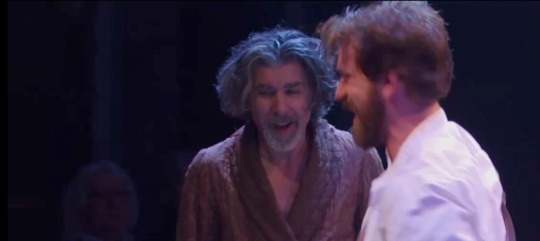
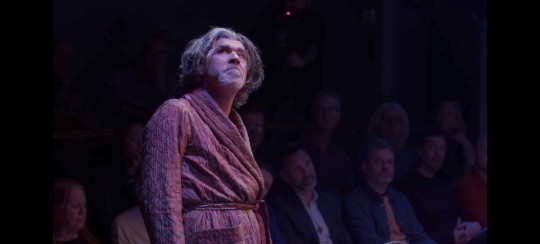
Had a great time seeing James Lance in Uncle Vanya in person and watching again online. Although I did spend most of the online watch taking screenshots. I just love watching his expressions when the other actors are speaking.
21 notes
·
View notes
Text
Update on Previous Post.
Screening ended. We were asked to let Glenn Howerton exit because he had to get ready for the Emmys.


He ended up hanging in the lobby and who is in the lobby talking to a kid who is coloring with his parents?
This Independent guy.
Yes, this is Dashing Tweed. He made sure to tell this very stylish guy who came over. He told the guy his fit (the guy's fit) was filthy (said in a delighted way that's not bad meaning bad, but bad meaning good). He asked the guy if he knew how to tie a bow tie and I think he was quite serious, too. He repeated the question because the guy didn't hear him. Someone teach this man how to tie a bow tie!
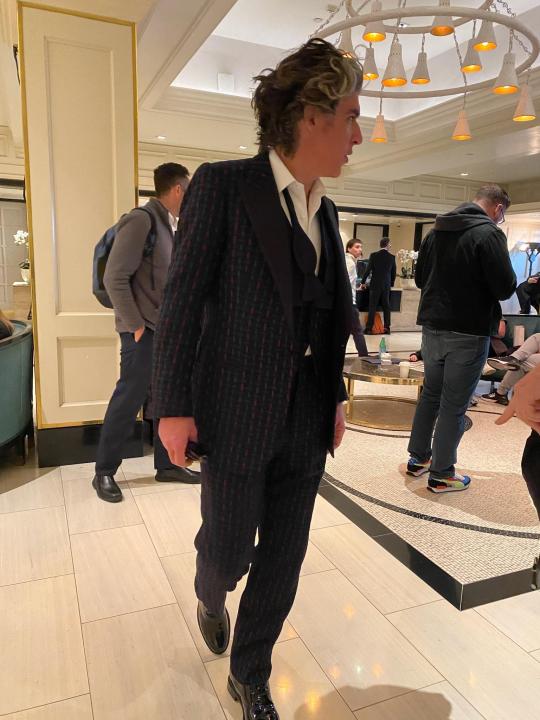

I congratulated him on UNCLE VANYA. He asked how did I hear about it and I told him the press release was out. He did a nervous hand flutter. By that time other people came over. He asked if I wanted a picture with him. Someone took it for us so I have my own finger-pointing James pic - albeit very blurry one.
As I am typing this James, Billy and Kola all come downstairs. James stops to walk over to where someone is seated with their poodle so he could pet and coo at it. Billy looks fantastic! Brett left a few minutes earlier.
Jeremy and Nick exited together.
Phil and his partner are leaving. Seem to be the last to leave. Ellie is in a cobalt or royal blue dress. Phil is wearing an open collar no tie. From what I can see he was the only one to have professional photos taken so I expect to see a pic of he and Ellie exiting the lobby.
#ted lasso#ted lasso alums#james lance#emmys#ted lasso cast#brett goldstein#phil dunster#kola bokinni#billy harris#nick mohammed#glenn howerton#emmys 2024#award season#blackberry#trent crimm#jamie tartt#isaac mcadoo#colin hughes#nate shelley#leslie higgins#roy kent#jeremy swift#uncle vanya
32 notes
·
View notes
Text
Reading the part where Charles tries to shoot Henry reminded me of Uncle Vanya written by Anton Chekhov. It almost felt like a parallel.
In the play, the protagonist, Vanya, spends his life working for his brother-in-law, who used to be an art professor, to support him financially. He basically worshipped him and rooted for him to come up with a masterpiece, only to find out he wasn’t capable of making art and his status was actually meaningless. Feeling betrayed, Vanya tells him he’s ruined his life and attempts to shoot him—twice—but fails.
Only Vanya realizes his brother-in-law lacks talent; all the other characters continue to look up to him and never listen to Vanya. The professor is also married to a woman Vanya is obsessed with. Do these ring a bell?
Charles, too, was captivated by Henry’s ideas and did everything he told him to do, just like the rest of the Greek class did. But he was the only one to start doubting Henry, realizing everything he’d done for him was not only pointless but had actually led them into worse situations. Henry had also separated Camilla—whom Charles was obsessed with—from him. He tried to shoot him, telling him he’d ruined his life, but failed.
Might be coincidence. But if it really is, it’s very interesting. The Secret History and Uncle Vanya do share similar themes partially, and I think Donna might have gotten inspiration from the play.
19 notes
·
View notes
Text

“SONIA: What can we do? We must live our lives. [A pause]
Yes, we shall live, Uncle Vanya. We shall live through the long procession of days before us, and through the long evenings; we shall patiently bear the trials that fate imposes on us; we shall work for others without rest, both now and when we are old; and when our last hour comes we shall meet it humbly, and there, beyond the grave, we shall say that we have suffered and wept, that our life was bitter, and God will have pity on us. Ah, then dear, dear Uncle, we shall see that bright and beautiful life; we shall rejoice and look back upon our sorrow here; a tender smile—and—we shall rest. I have faith, Uncle, fervent, passionate faith.
[SONIA kneels down before her uncle and lays her head on his hands. She speaks in a weary voice] We shall rest. [TELEGIN plays softly on the guitar] We shall rest. We shall hear the angels. We shall see heaven shining like a jewel. We shall see all evil and all our pain sink away in the great compassion that shall enfold the world. Our life will be as peaceful and tender and sweet as a caress. I have faith; I have faith. [She wipes away her tears] My poor, poor Uncle Vanya, you are crying! [Weeping] You have never known what happiness was, but wait, Uncle Vanya, wait! We shall rest. [She embraces him] We shall rest. [The WATCHMAN’S rattle is heard in the garden; TELEGIN plays softly; MME. VOITSKAYA writes something on the margin of her pamphlet; MARINA knits her stocking] We shall rest.”
~ Anton Chekhov, 'Uncle Vanya'
(Ian Sanders)
9 notes
·
View notes
Note
You have a great compilation of posts and GIFs of the fantastic Mr. Hinds as well as some other classic stars.
Have you Seen him in person?
Thanks! Yes, in October 2019, I went to London to see him in Translations at the National Theatre (I also had tickets to see him in Uncle Vanya but covid fucked everything up)
It was one of the most incredible experiences of my life. I was lucky enough to get an amazing spot where he had a monologue right next to me on some stairs.
After the play I waited two hours at the stage door but they had a party so he was inside the building for a long time.
There was a moment when he went out to smoke on the balcony right above me and I almost had a heart attack lmao
So after waiting a long time and all the actors having left I started to lose hope, I asked everyone I could if they had seen him but no one gave me a clear answer. Although everyone repeated what a wonderful and good person he is to calm me down because I was afraid to talk to him 🥺
But suddenly there was a moment when I turned around and saw him sitting at the bar of the NT having a drink with some friends. I didn't think twice and went up to talk to him.
He turned around with a smile and we started talking for 5 minutes. He was so kind and was interested in knowing if I had understood the whole play since I'm Spanish and in fact, he asked me about Spain and such.
Then I asked him to sign the program for me and I also asked for a pic. I had a black marker but he took a gold one out of his pocket to sign it because he said it would look much better that way (my legs were literally shaking there)
Aaaaand when we said goodbye, he shook my hand so I was on the verge of passing out lmao
I can't put into words how lovely he was to me. And I know firsthand that he is that way with everyone.
I guess you didn't need all those details but talking about him makes me so happy 🥰🥰🥰
#ciaran hinds#please Ciarán go back to the theater#i need to see him again 😭😭😭😭#the fact that he remembers the faces and sometimes the names of the people who greet him after the plays#he's something else#i love him sm#ask#dcruffolo#there are more details of what we talked about but I don't want to make a super long post lol
16 notes
·
View notes
Text
'Fleabag’s hot priest is about to take on his most liberating role yet: a one-man show of Chekhov’s Uncle Vanya in which he will play all nine roles, male and female. He loves taking risks, he says. It seems to be paying off…
I last saw Andrew Scott in the flesh eight years ago. I was sitting in the gloom at the top of what used to be St Martin’s School of Art in the Charing Cross Road – a tiny, temporary theatre had sprung up there – and he was three feet away from me, surrounded by great piles of stuff: newspapers, books, chairs, cupboards… a piano. The occasion was Richard Greenberg’s play The Dazzle, about two compulsive hoarders, the Collyer brothers, and his performance as one of them was mesmerising: in truth, almost too mesmerising. My mind went into overdrive. All that paper and mahogany. What if something toppled, and he was crushed – as the real Langley Collyer was – beneath a chest of drawers?
He wasn’t crushed, of course. But what’s striking and slightly odd is that today I’m seeing Scott in the flesh for the second time, and we’re again at the top of an old building – in this case, a public library – in rooms that feel a bit dilapidated, if not exactly derelict. People imagine the actor’s life to be a glamorous one, particularly if the actor in question has been in a Bond film – and of course it has its enchantments. But then there are the hours spent in spaces like this: long days of sandwiches, bottled water and elusive lines. When we came up in the ancient lift together, I couldn’t decide which of us was the more anxious. He was, I would guess. “MY TWELVE HOURS TRAPPED WITH FLEABAG STAR” ran the ticker tape in my mind as the mechanism creaked and groaned, and we each did our best not to meet the other’s eye.
Scott has spent the past three weeks here, deep in rehearsals for Vanya, a new version by Simon Stephens of Anton Chekhov’s great tragicomedy Uncle Vanya. But there’s new, and then there is… new. This adaptation gives the play, among other things, a contemporary setting. However, when the production opens in the West End, its chief novelty – and its chief draw, given Scott’s huge following – will be the fact that it is a one-man show. He will be playing all nine parts: male and female, young and old, beautiful and not-so-beautiful. It must be hard to learn so many lines, I say, once he’s (semi) comfortable on a battered leather sofa, his old, white T-shirt giving him a slight look of Marlon Brando. Doesn’t he feel like he’s going mad, with all these voices in his head? He laughs – a high-pitched, wicked laugh. “Yeah. I do, and it’s really hard [to learn]. Usually, when you can’t remember a line, another actor will say, ‘What time is it?’ or something, and then it comes to you. But now I’ve no one to cue me.” Alone on stage, he has had to change his mindset completely: “I’ve come to understand that I’m sort of looking after all these characters.”
The idea for a one-man production came about by accident. Scott, Stephens, and Sam Yates, who is directing the play, were workshopping it together (Scott has worked with Stephens twice before, most notably in Birdland at the Royal Court, in which he played a rock star who has made a Faustian pact with fame). “We miscalculated the parts, and I ended up having to act with myself, and it was kind of interesting. It gave birth to the idea that, as much as these characters say they’re different from each other, actually, some of them are very similar. I’m more interested now in those similarities than in, you know, doing a funny voice [for each one]. The production seems to me to be about what the act of creation is. I love the idea that you might be able to represent what a writer experiences on stage, all these characters in his head.”
But how on earth will the audience work out what’s going on? I understand about the funny voices, but won’t Scott have to change his a little bit when he’s acting the part of a woman? He smiles, teasingly. “I don’t think I should tell you that… But you don’t need to worry too much. I feel so liberated! I hope people will start to look at what’s within the performer so that something happens that can only really take place in a theatre – which is that you’re seeing one thing, but imagining something else.” This sounds like reading a novel, visualising scenes and characters for yourself, filling the gaps between words. He nods. “Look, I definitely don’t want to shy away from the ridiculousness of this project, and yeah, I’m nervous, but I’m loving the process. I think it’s a really sexy play. You know, Chekhov was a doctor, and he saw death so much, and I think he was able to understand human beings like no other writer.”
The argument that actors should only play who they are – that a gay character, for instance, may be played only by a gay actor – is made more and more often lately. But this production seems (to me, at least) subtly to resist the notion of identity politics in the theatre; to suggest that such rigidity may sometimes be a cul-de-sac. “It can be a cul-de-sac, certainly,” Scott says. “Of course those arguments have to be heard. The world isn’t a level playing field. But I think transformation is as important as representation. Our first understanding of storytelling happens when we’re young. Our mother or father is pretending to be a wolf. We know we’re safe, but we’re scared, too. Our parent can be a wolf! Human beings can create worlds within themselves. I don’t think we can just slice that out of ourselves.”
He knows some will heartily dislike this Vanya, but the thought seems, if anything, to excite him. “It could go wrong,” he says. “But we need a bit more of people not liking things.” He’s ambivalent, to put it mildly, about standing ovations, which seem to happen in the theatre most evenings nowadays. “My concern is that everything becomes meaningless. I think it’s unfortunate that if someone decides not to stand up, it’s perceived that they hated it. That’s not necessarily true. Maybe I thought it was very good, but I didn’t feel like rising to my feet. My producers are going to hate me for saying this, but I strongly believe that if people don’t feel like standing up, they shouldn’t. People feel lonely, having to stand when they don’t want to. Equally, it’s kind of moving when most people are not standing up, and three people are.”
Does he blame the internet for this? Is it just another form of “liking” something? “I do blame the internet, yes.” But perhaps, too, it has to do with cost. “I was recently on Broadway, and tickets there are astronomically expensive, and I thought: well, these people have to stand up because they’ve spent $390, so it’s got to have been one of the best nights of their lives.” Either way, he doesn’t understand it: the firmness and immediacy of people’s responses. “When you’ve just seen a play, it’s a really sensitive time. It’s weird when people start talking straight away about their new conservatory.” All this may explain why he feels there is more value for him in doing experimental work. “Some people will like it, some people won’t, and that’s great. I feel ferocious about wanting to take risks.”
In the coming months, Scott will be everywhere: a trick of scheduling, rather than by design. Vanya will be followed in January by the release of All of Us Strangers, a film in which he stars with Paul Mescal and Claire Foy (he plays a depressed screenwriter who goes to visit his childhood home, only to find that his parents, far from having died in a car crash when he was 12, are alive and well – though much of the coverage of the movie so far has focused on the fact that his character and Mescal’s are lovers). “It’s a beautiful film,” he says, dreamily. And then there’s Ripley, a Netflix series (its release is expected at the end of this year), based on Patricia Highsmith’s novel The Talented Mr Ripley, written and directed by Steven Zaillian, the screenwriter of Schindler’s List and Hannibal.
“It’s a big, big thing,” he says, of his role as Tom Ripley, grifter and serial killer. And yet, Scott said he wouldn’t be doing any more crazed sociopaths, having played Moriarty in Sherlock (he was also a baddie in the Bond film Spectre). “I know, but what I find interesting about him is not the psycho-ness; it’s the otherness. To me, it’s about what it’s like never to be invited to the party. We all know people who don’t make it easy for themselves, who are maybe a bit strange. But if you’re constantly ignored, or sidelined, or don’t fit in, what happens? Is it that something dark emerges? I don’t mind saying that playing him was challenging. It was very lonely. We filmed during Covid, and the five-day isolation requirements that were in place both here and in Italy meant people couldn’t come and visit, and I couldn’t come home. It’s eight hours of television, and he’s a solitary figure in this version, so I was on my own a lot.”
Scott is 46, though you wouldn’t know it; his enthusiasm, like his fidgetiness, belong to a younger man. He grew up in Dublin, with his two sisters – his father worked at an employment agency; his mother was an art teacher – where he was educated at private Jesuit school, attending drama classes on Saturdays. Art was his first plan – painting is still his great love; he can’t wait for the forthcoming Hockney show at the National Portrait Gallery – and he won a bursary to art school at 17. But then he was cast in a film, Korea, about an Irish boy emigrating to America in the 1950s who’s enlisted to fight in the Korean war, so he turned the place down, and once the movie was done, went to Trinity College to study drama instead. After six months, bored by the course, he left to join Dublin’s Abbey theatre.
He seems hardly ever to have been out of work, and his CV is such a mixture: Gethin the tense gay Welshman in Matthew Warchus’s film Pride; eccentric Lord Merlin in the BBC adaptation of The Pursuit of Love; an acclaimed Hamlet in 2017 at the Almeida theatre. By this point, his mantlepiece – he has two, one in London, and one in Dublin – must be quite frantic with statuettes (his most recent win, in 2020, was a Laurence Olivier award for best actor for his performance as Garry Essendine in Noël Coward’s Present Laughter). Does he feel blessed? “Yes, and that’s a really nice way of putting it. I’m grateful.” But perhaps this sounds too… humble: “I’ve never understood why there’s some sort of shame associated with being an artist. I feel able to call myself one.”
His fame is at a level that means he can move around London unnoticed, and he’d like to keep it that way. “I’m suspicious of it. I’ve no real interest in the value of it. The idea of being followed by a photographer seems hellish to me.” Does it affect his relationships? He doesn’t believe that it does, though there are “creepy, unsavoury people” out there who might not “have my best interests at heart”. Is he single? “Yes, I am.” Would he like to meet someone? He would. Surely it’s easy in his world? So many lovely new people entering his orbit all the time – and with his looks… He laughs. “That’s a lot of projection, there,” he says, sounding suddenly more Irish.
I read somewhere that some women in Ireland will always think of him as the guy who turned up to their demonstrations in the run-up to the abortion referendum in 2018, even when it was raining (the vote overturned the ban on abortion in the country, and followed one of 2015, which allowed same sex couples to marry). Isn’t it amazing how much Ireland has changed? When he was 16, it was still illegal to be gay, as he is. “Yes, it’s immense for people of my generation to have been emancipated from the shame of the Catholic church. But it’s interesting. Privacy matters to me, but then I remember Sinéad O’Connor being on The Late, Late Show, talking about human rights, and how important that was. Her kindness… We’re only just finding out about it. She didn’t announce it to the world. Again, it brings us back to social media. Does kindness happen if you don’t tell everybody about it?”
Scott is no longer a practising Catholic. But he can’t be certain this means he won’t call for the priest at the end (this conversation has taken a morbid turn, and it’s my fault). Perhaps it’s in the marrow. “It’s the organisation that’s the problem, not the principles behind it, which are very beautiful for the most part. I remember when Simon and I were doing [the play] Sea Wall. One of the lines in it is: show me God, where is he? And then the next line is: well, show me love, where is that? You can’t get evidence for either of them really. They’re just strong feelings. I believe in the power of love. I feel it’s stronger than anything, because you can’t do anything about it. I’ve so much of it in my life, and one of the things I’m most proud of is how much I’m able, not only to receive it, but to give it – and if somebody thinks that’s sentimental or mawkish, well, to me it’s the opposite.” He talks for a while in this vein. “I want to try to be a good person; not just a nice person, but a good person,” he says, his voice racing on – and it makes me think of him as the Hot Priest in Phoebe Waller-Bridge’s Fleabag, the role for which he may now be best known. If every pulpit came with an Andrew Scott, our churches would be bulging at the seams.
Soon after this, there’s a knock on the door. It’s time to begin rehearsal (in the hall outside, his director stands at a lectern, looking quite priestly himself). He has, he says, another three weeks to go before Vanya opens, and when it does, he’ll be looking out for me; I’d better be sitting down at the curtain call, he jokes. Well, perhaps I’ll have good reason to be sitting down, I joke back. But he’s ever serious: “I always remember what my mum used to say. She’s an art teacher, and she used to tell us that a good drawer never rubs out. So, you draw a line, and then you get it wrong, and then you start a new line. The fact that people can see your old line doesn’t make them appreciate your new line any less. It may even make them appreciate it more.” What he means, I think, is that he believes it’ll be all right on the night.'
#Andrew Scott#Fleabag#Vanya#Ripley#The Dazzle#Anton Chekhov#Uncle Vanya#Simon Stephens#Sam Yates#Birdland#All of Us Strangers#Paul Mescal#Claire Foy#Jamie Bell#The Talented Mr Ripley#Patricia Highsmith#Steven Zaillian#Moriarty#Sherlock#Spectre#Pride#Lord Merlin#The Pursuit of Love#Hamlet#Almeida Theatre#Noel Coward#Present Laughter#Olivier Awards#Sea Wall#Phoebe Waller-Bridge
25 notes
·
View notes